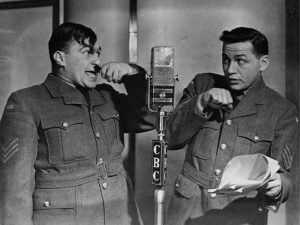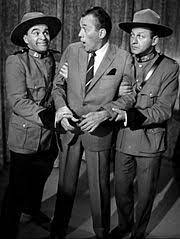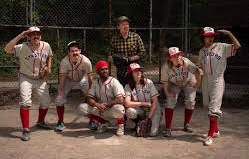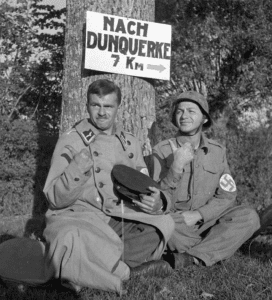
It’s June 1944. Two men in Canadian Army battledress are hunkered down waiting for orders. One’s a soldier with sergeant’s stripes. The other’s a private in a greatcoat.
“Time to move out,” says the sergeant.
“I won’t do it,” retorts the private.
“You will, too. When an order is given, it must be obeyed!” And the sergeant points a gun at the enlisted man. “Do it or else.”
At precisely the same moment, there’s the sound of an artillery shell exploding nearby, and the two soldiers dive for cover. Sgt Johnny Wayne then turns to Pte Frank Shuster and says, “And we’re still in Canada! Imagine what it’ll be like when we get overseas!”
Yes, the two quirky characters in Canadian Army uniform reciting gag lines were comedy duo Wayne and Shuster from a wartime recording on CBC Radio. With much of the world focused on next week’s 79th anniversary of the D-Day landings in France, it’s appropriate to remember that more than army, navy and air force troops contributed to the greatest amphibious invasion in military history on June 6.
So did entertainment troupes. Wayne and Shuster, who’d initiated their comedy writing at Harbord Collegiate and U of T in the 1930s shipped overseas as trained soldiers but with orders to entertain Canadian soldiers behind the lines in Normandy. Back in Canada, just as television dawned in 1952, they premiered the Wayne and Shuster Hour.
“It’s great experience,” said Johnny in one of their CBC sketches. “It has to be,” added Frank, “because there’s no money!”
Prophetic punch line, it turns out. Because for half a century, the duo provided week after week of very Canadian, very cornball but very funny television entertainment – on the CBC which was not known for its extravagant budgets.
Wayne and Shuster spoofed Parliament Hill, the Mounties, Crown corporations and even Shakespeare for more than 50 years, twice winning best comedy honours from Motion Picture Daily and TV Today in the U.S.
And they grew an extraordinary supporting cast – Don Cullen, Jack Duffy, Paul Kligman, Larry Mann, Tom Harvey, Carol Robinson and Ben and Sylvia Lennick among many. Sylvia was always remembered in a W&S parody called Rinse the Blood off My Toga. In it, Wayne plays Flavius Maximus, private Roman eye, investigating the murder of Julius Caesar. He interviews Caesar’s wife Calpurnia and she (Sylvia) wails, “I told him, Julie, don’t go! He wouldn’t listen!”

The experience-no-money comment also resonates through W&S’s profile outside Canada. In 1958, the host of America’s most popular variety television show, The Ed Sullivan Show, signed Wayne and Shuster to regular Sunday night appearances on CBS. They were invited back some 57 times, more than any other act in show business.
But they never left their base in Canada.
Since Johnny Wayne died in 1990, Frank Shuster in 2002, both families have urged the CBC to re-air the vast archive of W&S classics. The CBC has resisted, claiming that rights and payments have to be renegotiated with the original musicians, cast and crews, even though most are long dead. The CBC owns the TV shows, but the families own the scripts.

Enter: Bygone Theatre, which last week staged four performances of W&S classics at Hart House on the U of T campus. The Bygone cast of six, directed by Paul Bates and produced by Conor Fitzgerald and Emily Dix, delivered many of Johnny’s and Frank’s greatest creations, including a favourite of mine, A Shakespearean Baseball Game.
The sketch, written in iambic pentameter and rhyming couplets, features Shuster as Stratford’s baseball club manager, announcing the team roster, “with Harry, Joe and Pete out in the field. … And you three guarding your accustomed bags – Sam the first, Bill the second and Richard the third.”
Meanwhile, Wayne portrays Rocky, the team’s best hope for a win; but he laments: “Oh, what a rogue and bush-league slob am I. … O cursed fate, that I who led the league should bat .208. A hit, a hit, my kingdom for a hit!”

Michael Wayne, Johnny’s son, told Ellin Bessner on her podcast CJN Daily last week, “I’d like to see these sketches seen as they were seen at the time, to understand what they say about the period in which the comedy was made. … Johnny and Frank became a unifying force for the country. They really felt they were part of creating a new Canadian culture.”
Indeed, this week as Canadians observe another anniversary of D-Day, it’s timely to acknowledge the service of two young Canadian soldiers who had something to say with their comedy and about their country.
Quipped Johnny Wayne in 1944: “We were the only soldiers in World War II fired at deliberately by both sides.”